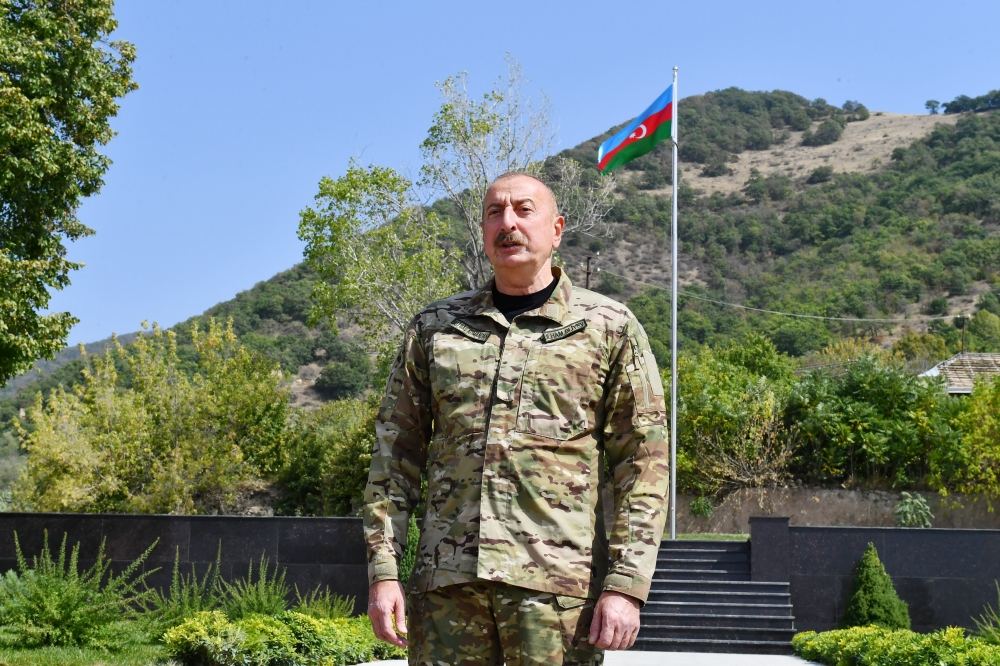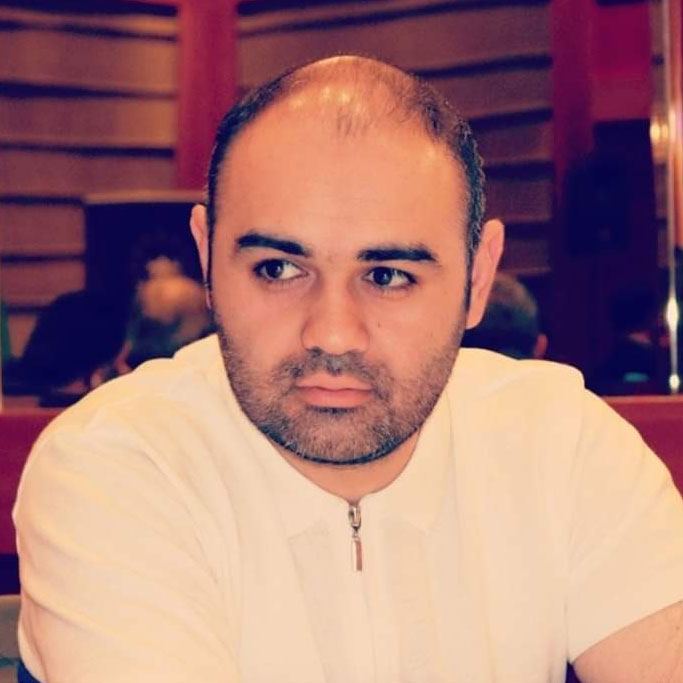BAKU, Azerbaijan, September 23. While delivering a speech after raising the Azerbaijani flag in Lachin, President Ilham Aliyev pointed out peace proposals of Baku to Yerevan, maps of delimitation, Armenia's unwillingness to provide the Zangazur corridor, the country’s revanchist ideas and contradictory approach to the delimitation process, as well as responded to Armenia's claims regarding the latest tension on the interstate border, Trend reports.
The head of state said Azerbaijan had offered peace to Armenia immediately after the second Karabakh war, while Yerevan kept sticking to its revanchist ideas and didn’t want peace.
"We offered them peace immediately after the war. This is perhaps one of the handful of examples in the military history of the world when lands remain under occupation for 30 years, people live in suffering and deprivation, historical and religious monuments are destroyed, cities are razed to the ground, and more than a million mines are planted, and yet we are offering peace. However, we see again that Armenia is not interested in peace. It is still cherishing some revanchist ideas," the president stressed.
The recent events have shown the Armenian authorities’ conflicting approach regarding the peace agreement and attempt to evade their obligations following the signing of the trilateral statement of November 10, 2020. Yerevan's indifference to Baku's peace proposals based on the mutual recognition of territorial integrity is yet another obstacle to the border delimitation process.
The president’s speech reflected the decisive position of Azerbaijan over the delimitation process, as well as the major points regarding the relevant maps.
"We proposed to them to start the delimitation process. This process has stretched out over about a year. Now, although this process has started, it is purely formal in nature, there are no negotiations on the substance of the issue and no discussion around maps. We have prepared all the maps – both maps of the 20th century and maps of the previous era. The process of delimitation should be carried out on the basis of these maps," the head of state stated.
Thus, it has become clear again that Azerbaijan is able to start the delimitation process with Armenia without any intermediaries, and Baku has all maps required for a rapid and accurate process. However, the Armenian leadership’s refusal to sit down at the negotiating table slows down the mentioned process. Armenia’s delaying the peace negotiations impedes the construction of the Zangazur corridor, which is of vital importance for Azerbaijan and other countries in the region.
The head of state underscored Yerevan's attempts to back out of the construction of the Zangazur corridor, noting that, unlike Armenia, Azerbaijan fulfills its obligations in a timely manner.
"Armenia was supposed to provide a corridor that would ensure a connection between the main part of Azerbaijan and the Nakhchivan Autonomous Republic. So far not only have they failed to provide the corridor but also the route of the corridor has not been communicated to us. No specific work has been done. We have now built the railway to Zangilan. We built the highway to Zangilan. At the end of next year, we will bring both the railway and the highway to the border with Armenia. However, nothing is being done on the territory of Armenia, and it seems they are unwilling to do anything. They are still delaying time," said President Ilham Aliyev.
Furthermore, the head of state outlined Armenia’s failure to fulfill not only the Zangazur corridor obligation but also all other commitments.
"We have proposed five principles for the signing of a peace treaty with Armenia. In words, they accepted them, but we do not see it in practice. Again, this is a stalling tactic. According to the act of capitulation signed by Armenia on 10 November 2020, the Armenian armed forces should have withdrawn from Karabakh. They haven’t fully withdrawn yet," the President of Azerbaijan said.
In general, Armenia's refusal to comply with its obligations contributes to the regional tension, which has been once again proved by the latest border clashes.
Speaking of the threats posed by Yerevan to long-term peace in the region, the head of state noted that on September 13, Azerbaijan fought back against Armenia.
"As a result, when another provocation was committed against us on 13 September, the Azerbaijani Army responded and put the enemy back in place yet again. I do hope that this will finally teach them a lesson. Because they saw that no-one and nothing could stop us. No-one's call, no statements or initiatives can stop us. We are on our own land and we are protecting our own land. Our positions along the border allow us the opportunity to anticipate any Armenian provocation and take necessary measures. We are in favorable positions on the Azerbaijan-Armenia border all the way from Mount Murov to the Araz River. These positions give us both a military advantage and the possibility of visual control over a large area, including control over important communication lines, and we are already based in these areas. We didn’t have access to these borders for 30 years," the president emphasized.
The words "no-one's call, no statements or initiatives can stop us" testify to the continued international pressure on Baku and Azerbaijan’s unwavering position in this regard. During the border clashes, Armenia tried to pull off a plan to increase international pressure on Azerbaijan, but its plans were doomed to failure as a result of Baku’s diplomatic maneuvers and political influence. Yerevan also attempted to make it seem as if Azerbaijan had invaded the sovereign territory of Armenia and was conducting an occupational operation. President Ilham Aliyev said the Armenian leadership, media, some international organizations, and states had no grounds for making loud statements.
"After the second Karabakh war ended, we accessed our borders. If Armenia wants to accuse us of entering their territory, there is no basis for that. First, if the border was where they said it was, they should have established the border, built border lines there, established communications and carried out engineering work. They were under the impression that all of Karabakh and Zangazur would remain for them, which is why they did not do anything on the Azerbaijan-Armenia border. In other words, in the absence of border delimitation, no-one can claim where the border passes. Let me reiterate that we are ready for discussions and are treating the work of delimitation commissions, the Azerbaijan-Armenia commissions, with great responsibility. We have collected all the maps," President Ilham Aliyev said.
Therefore, the head of state has clearly stated that both the military and political steps of Baku are based on official documents. One of the essential points strengthening Azerbaijan’s position at the negotiating table and on the battlefield is the submission of official documents.
President Ilham Aliyev added that the paragraph concerning the alternative road construction to the Lachin corridor was included in the trilateral statement upon his insistence. Hadn’t this paragraph been included in the document, would it have been possible to return to Lachin and the surrounding villages in a short time and without losses? Of course not. Baku's response with official documents enhances Azerbaijan’s strong position on the border issues as well.
Moreover, the president has clarified once again that Azerbaijan is prepared to give a weighty response to the enemy's revanchism attempts in case of any threat arises.







